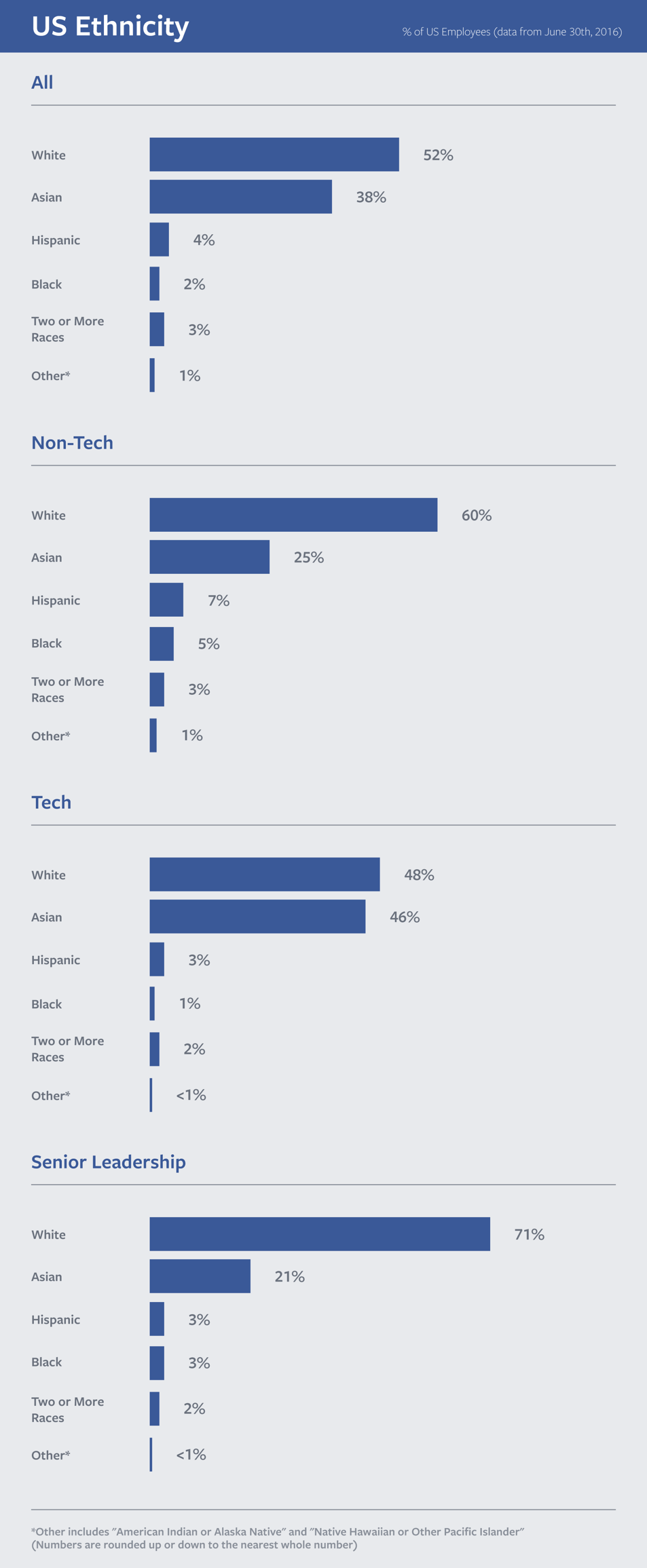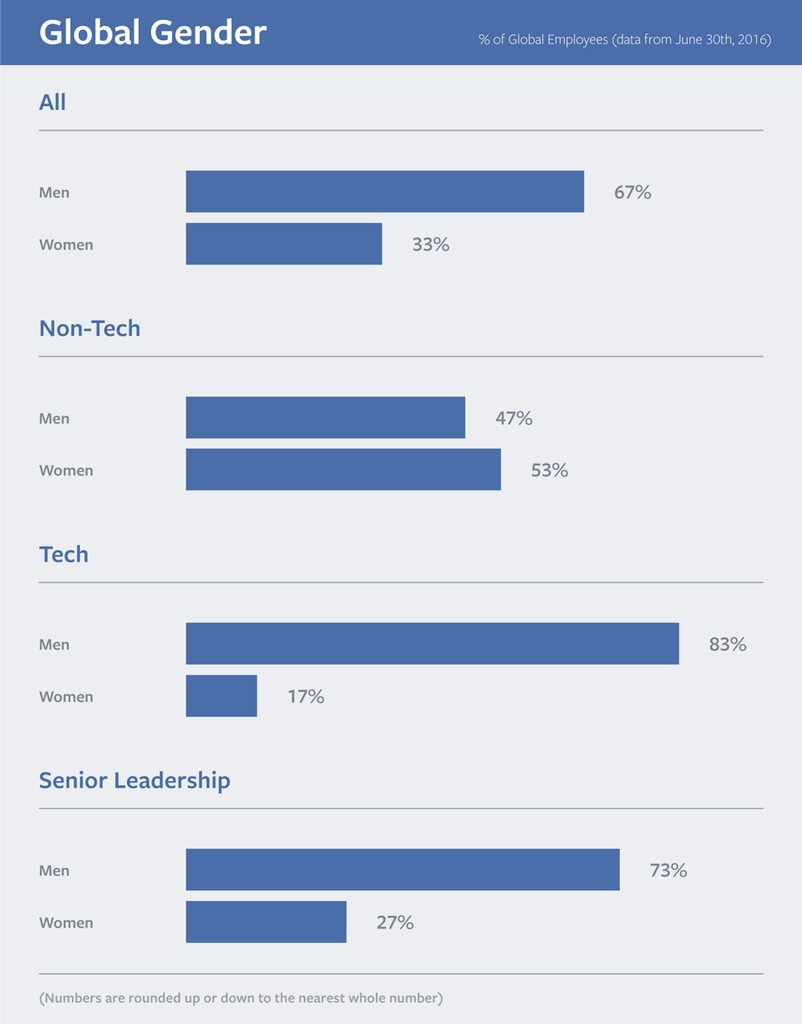By Maxine Williams, Global Director of Diversity
- Facebook commits $15m to Code.org and takes TechPrep resource hub to communities of color across the country
- Facebook announces LGBTQ data for the first time
Facebook’s mission is to give people the power to share and make the world more open and connected. In order to achieve that mission, we need an employee base that reflects a broad range of experiences, backgrounds, races, ethnicities, genders, sexual orientations, abilities and many other characteristics.
Over the past few years, we have been working hard to increase diversity at Facebook through a variety of internal and external programs and partnerships. We still have a long way to go, but as we continue to strive for greater change, we are encouraged by positive hiring trends. For example, while our current representation in senior leadership is 3% Black, 3% Hispanic and 27% women, of new senior leadership hires at Facebook in the US over the last 12 months, 9% are Black, 5% are Hispanic and 29% are women.
It has become clear that at the most fundamental level, appropriate representation in technology or any other industry will depend upon more people having the opportunity to gain necessary skills through the public education system. Currently, only 1 in 4 US high schools teach computer science. In 2015, seven states had fewer than 10 girls take the Advanced Placement Computer Science exam and no girls took the exam in three states. No Black people took the exam in nine states including Mississippi where about 50% of high school graduates are Black, and 18 states had fewer than 10 Hispanics take the exam with another five states having no Hispanic AP Computer Science (CS) test takers. This has to change.
We want every person in this country to have the opportunity to learn the skills that our industry needs — and we want the chance to hire them. This is why we are committing $15 million to Code.org over the next five years. Facebook’s five-year commitment will help Code.org to drive the development of curricula, public school teacher-training and student skills-building, particularly among traditionally underrepresented populations in engineering and computer science. It will give thousands of students across the country the access to computer science they deserve.
At Facebook, we care enormously about this. Promoting diversity is a core part of our COO Sheryl Sandberg’s public policy advocacy. As Mark Zuckerberg, our CEO, said when he announced his support for President Obama’s “Computer Science for All” initiative, “When people learn to code, they get the opportunity to build the products of the future and move our society forward.”
In addition to our commitment to Code.org, we have a variety of short, medium and long-term initiatives designed to drive change at Facebook and the larger technology industry.
Short Term: Building a Diverse Slate of Candidates and an Inclusive Working Environment
Our diverse slate approach encourages recruiters to look longer, harder and smarter for more diversity in the qualified talent pool. Our goal is to create an environment where diversity is considered an indispensable part of the search for great talent.
Because we recognize that some of the biggest impact comes from investing in the tools and resources we provide employees, we have improved our talent-sourcing tools, invested in better training for everyone involved in hiring and managing diverse teams, and strengthened our relationship with a diverse partnership network to field great talent.
We also know that the work of getting more underrepresented talent to Facebook doesn’t stop when someone accepts a job offer. We work to build an inclusive environment through our training on managing unconscious bias. Nearly 100% of people at the manager level and above — and 75% of all US employees — have taken our Managing Bias class. After positive feedback from companies that wanted to learn more about the course last year, we made it publicly available and free to everyone online. This training is structured so that companies of all sizes can use the training as-is, or tailor it to their needs.
We incorporate diversity best practices in our HR systems while delivering and supporting a range of learning and development programs, including Lean In Circles. Our Employee Resource Groups continue to grow and provide community for underrepresented groups and allies.
Medium Term: Supporting Students with an Interest in Tech
We continue to grow our Facebook University (FBU) program, a training program focused on undergraduate college students from underrepresented groups. After launching FBU for Engineering in 2013 with 30 students interested in computer science, we’ve grown the program to include 170 students this summer. This growth came with the addition of FBU for Business in 2015, and FBU for Analytics which is new this summer – both of which are focused on business functions at our company where coding is not a prerequisite. When we started FBU in 2013, we knew it could be years before we saw students return for full-time jobs at Facebook. This year, for the first time, we are proud to welcome a handful of former trainees as full-time employees. We look forward to welcoming more FBU candidates in the future.
A year ago we launched our Computer Science and Engineering (CS&E) Lean In Circles program in partnership with LeanIn.Org, LinkedIn and the Anita Borg Institute. This program aims to support women already in college who show an interest in computer science. Our hope is that with additional support, they will stay the course through graduation and we will experience an improvement in the number of women graduating with these critical skills. Currently only 18% of people graduating in the US with degrees in CS are women — what’s worse is that the number of women graduating in the US with degrees in CS has been steadily declining since the late 1980s. Today, women are also 32% more likely than men to leave STEM fields by switching majors. Due to our efforts, there are now over 250 circles on university campuses around the world. The program continues to expand via Lean Internship Circles for students interning at more than 85 companies all over the Bay Area. Lean Internship Circles have also expanded to New York City, and we look forward to seeing hundreds of interns support and encourage one another through CS&E Circles this summer.
Long Term: Creating Opportunity and Access
We know it will require long term commitment to close the opportunity gap. Moving middle schoolers to new hires is a 10-year process. That’s why in addition to our $15 million commitment to Code.org, we continue to invest in TechPrep, an online resource in both English and Spanish for parents, guardians and future programmers who want to learn more about computer science and programming. Since we launched TechPrep last October, the site has had over half a million unique visitors from all 50 states. In April, we kicked off our TechPrep Roadshows, which are community-based events where parents, guardians and future programmers are invited to learn more about careers in technology and get in-person training on how to use the TechPrep site to develop programming skills, regardless of their current skill level.
Highlighting Facebook’s LGBTQ community
Diversity comes in many forms, and we want to take a moment to highlight the vibrant LGBTQ community here at Facebook.
In a voluntary survey of our employees in the US about sexual orientation and gender identity, to which 61% responded, 7% self-identified as being lesbian, gay, bisexual, queer, transgender or asexual. We are proud to support the LGBTQ community through our policies, products and extensive benefits for our employees.
Annual Diversity Data
As we noted above, we are encouraged by stronger diversity in our hiring trends, particularly among Black and Hispanic people and women in senior leadership, whose rates of hire exceed their percentages of representation in our current population. This strength in recruiting has also contributed to an increase by several percentage points of women in leadership, from 23% to 27% and Black people in non-tech from 3% to 5%.
Below is our full current demographic data:


While there is a lot of distance to cover in the short, medium and long term, we’re moving in the right direction.
Please note that due to the way the government tracks EEO-1 data, the numbers reflected in the below form are representative of a point in time in July 2015, and not our current 2016 data. The EEO-1 data also reflects job groupings and categories that do not align with the way Facebook groups employees internally. We believe that the information presented in this post is a far more accurate reflection of the progress we’ve made and the work that remains to be done.